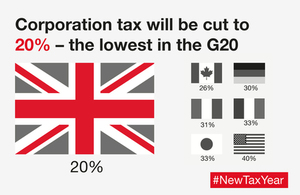Millions set to benefit as tax reforms come into effect
Tax changes coming into effect in a week will see Britain’s businesses benefit from lower taxes – helping them reinvest more of their money in growing their business and hiring more staff.

Corporation tax will be cut to 20% – the lowest in the G20.
Backing business
On 1 April, businesses will benefit from:
- lower corporation tax bills as the government delivers another reduction in corporation tax to 20% - the lowest rate in the G20 and the biggest reduction in the corporation tax ever delivered in a single parliament
- extra support with business rates bills following the Chancellor’s £1 billion package announced in December which includes increasing the £1,000 retail discount to £1,500 for lower value high street shops, pubs, cafes and restaurants and continuing the support available for 575,000 small businesses
- access to a new 25% tax relief for children’s TV production – supporting Britain’s thriving creative industries
- a fairer tax system as the government clamps down on multinational companies artificially shifting their profits offshore to avoid paying tax in the UK and making sure banks pay their fair share of tax
In addition to these changes, from 6 April employers hiring under 21s will no longer have to pay Employer National Insurance Contributions (NICs) for these staff – allowing them to reinvest more of their hard earned money into growing their business – and people employing care and support workers to look after themselves or family members will be able to claim up to £2,000 off their employer NICs bill.
View our list of changes coming into effect in April 2015.
Supporting hardworking families
From 6 April, 27.3 million taxpayers will also pay less income tax as the government raises the personal allowance from £10,000 to £10,600.
This government’s commitment to helping people keep more of the money they earn means a typical basic rate taxpayer will be £120 better off in comparison to April 2014 and £825 better off than they were in 2010.
As well as benefiting from the personal allowance increase and an increase in the higher rate tax threshold, hardworking taxpayers will also be able to make the most of their savings as:
- they won’t have to pay tax on the interest they earn on their savings if their taxable income is below £15,600 - lifting 1.5 million out of paying tax on their savings income.
- the cash ISA limit goes up to £15,240
- they will pay less tax on flights to hundreds of long-haul destinations
Chancellor of the Exchequer George Osborne said:
Backing business and supporting hardworking families are key parts of our long term economic plan. That is why I am delighted that we are once again cutting tax bills for millions of businesses and individuals.
The tax changes taking effect next week will reduce the cost of employment, ease the tax burden on businesses and stimulate investment in our thriving creative industries. It will also mean taxpayers get to keep more of the money they earn.
Background:
The following tax changes will also come into force on 6 April:
Over 4 million married couples and 15,000 civil partnerships will be eligible for a tax break as the government introduces measures to allow eligible couples to transfer up to £1,060 of their personal tax free allowance to their partner.
The most ground-breaking pension reforms in nearly a hundred years come into force. For the first time, this government will be giving pension savers real freedom and choice over how they use their savings in retirement. From April 6th people will no longer be obliged to buy an annuity and be able to access their defined contribution pension flexibly. The law will also change so that if an individual dies before the age of 75, they will be able to pass on their pension tax free.